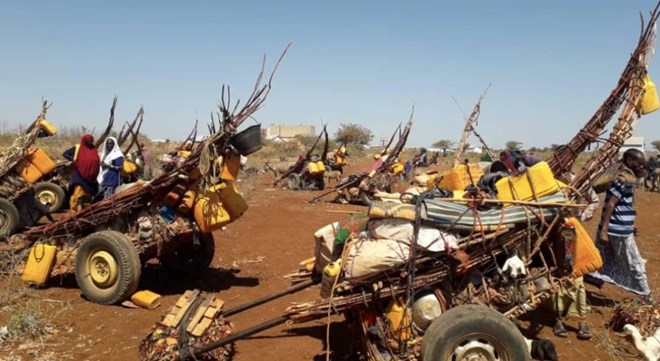
Saturday March 12, 2022

UNHCR, the UN Refugee Agency, is scaling up assistance to thousands of people displaced by severe drought in Somalia following three consecutive failed rainy seasons that have decimated crops and livestock.
People’s coping mechanisms have been eroded, forcing thousands to flee their homes in search of humanitarian assistance including food, shelter, and safe drinking water.
In the first week of March alone, more than 17,000 people in the country’s southern Bay region were internally displaced by the drought, joining tens of thousands of people similarly displaced across the country between January and February this year.
If the current trend holds, UNHCR estimates that in 2022 alone half a million Somalis will likely be displaced before the end of March.
The majority are reported to be children, older people, and pregnant and lactating mothers. Families are arriving to urban centres or existing settlements for internally displaced people, where living conditions are often difficult and there are few resources to cover the additional needs of the new arrivals.
Many children have dropped out of school to help their families earn a daily income and search for water and pasture. This has made them particularly vulnerable to risks such as forced marriage, family separation, and sexual violence and abuse. Women and girls, who make up half of the displaced population, are at heightened risk.
UNHCR is working closely with humanitarian partners to deliver much-needed assistance. So far, shelter materials, hygiene items, and other necessities have been delivered to 36,000 drought-affected people in the country, including 24,000 people in Galmudug and Puntland regions where the situation is most dire. Separated and unaccompanied children are being provided with medical assistance, psychosocial support, and counselling as well as safe spaces to protect them against forced child recruitment.
Families at risk of being evicted from their homes due to loss of income are also receiving legal assistance. In the coming weeks, at least 200 entrepreneurs will receive grants to help revive their businesses.
Globally, the climate crisis is accelerating, and the consequences of inaction are mounting. Many ecosystems are at a tipping point, and we are already seeing devastating effects on human health and life. Vulnerable communities are being hit the hardest, among them refugees, displaced, and stateless people. Over 80 per cent of refugees and internally displaced people come from the most climate vulnerable countries worldwide.
A report from the Intergovernmental Panel on Climate Change last week highlighted the uneven impacts of the climate crisis on communities that have less capacity to adapt. Vulnerabilities are being amplified where people are already facing poverty, limited access to basic services and resources, conflict, and climate-dependent livelihoods.
Urgent investments are needed to build up strong adaptive capacities where they are most needed. Without them, we will witness greater suffering, loss of life, and increasing displacement.
In 2022, UNHCR requires US$157.5 million to deliver critical aid and protection to approximately 2.9 million internally displaced people in Somalia, 40,000 refugee returnees, some 31,000 refugees and asylum seekers, and up to 15,000 new arrivals from Ethiopia and other countries. As of 1 March 2022, only 5 per cent of that amount had been received.